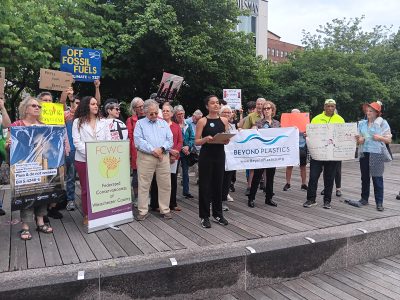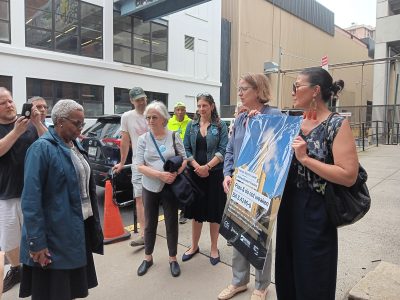Environmental Advocates’ Coalition Renews Push for Plastics Reduction Bill
News Based on facts, either observed and verified directly by the reporter, or reported and verified from knowledgeable sources.

Environmental advocates last week implored Senate Majority Leader Andrea Stewart-Cousins to bring a bill to a vote which they argue would significantly reduce plastic packaging in the state while providing health, environmental and social justice benefits.
With a little more than a week remaining in this year’s legislative session, representatives from a wide array of organizations called on lawmakers in Albany to vote on the Packaging Reduction and Recycling Infrastructure Act. The measure was introduced in the Senate by state Sen. Peter Harckham (D-Lewisboro).
“Plastics is no longer just a pollution issue, it’s a public health crisis,” said Ellen Weininger, director of educational outreach at Grassroots Environmental Education. “We are beyond the tipping point.”
Key points of the legislation include reducing the volume of plastic packaging by 50 percent within 12 years, then requiring all packaging to be at least 70 percent recyclable after that, said Nyah Estevez, a community organizer with Beyond Plastics, a nationwide group based at Vermont’s Bennington College that is dedicated to ending single-use plastic.
Other benefits would be the elimination of 19 chemicals, including PFAS, mercury and lead, to halt viewing chemical recycling as actual recycling and imposing a fee on packaging paid by product producers that would go back to many local governments who pay bear the cost of paying companies to haul the trash.
It is estimated that about 14 percent of New York State’s waste stream is comprised of plastic.
In addition to the environmental benefits, Estevez said the measure would help improve people’s health in Westchester because it would limit the release of deleterious microplastics when it is burned at the Wheelebrator facility in Peekskill.
“More plastic means more taxpayer spending to get rid of our trash and more harmful pollution for the low-income and majority of people of color in the Peekskill community, Estevez said. “This is happening all over the state. Low-income communities and communities of color are faced with the negative impact of polluting incinerators and leaching landfills, all because of our single-use plastics problem is going out of control.”

The contingent of 30 to 40 advocates dropped off a petition at Stewart-Cousins’ district office in Yonkers on Thursday with more than 30,000 signatures urging for a vote before the session is scheduled to end on June 6. Advocates said with strong bipartisan support across the state, it would have no problem passing the legislature.
Polls show that 82 percent of New Yorkers view single-use plastics as a problem and 70 percent support the bill, Estevez noted.
Harckham said the benefits of the legislation are clear but there are also hurdles, including battling industries opposed to the measure.
“This will be a meaningful game changer,” Harckham was quoted as saying in March. “But that’s also why it’s been so challenging because we are trying to change many systems here that have profited by doing things the way they’ve always been done.”
Inquiries posed to Stewart-Cousins’ Westchester and Albany offices went unanswered.
The legislation is opposed by various groups, including the American Chemistry Council, a trade organization in the petrochemical industry. They have taken out ads in The Examiner and other outlets, arguing that it will increase the costs of goods, hurt small business and limit the choice of products for some items because it will be too expensive for some companies to comply.
However, Keiko Niccolini, from Hudson Valley Mothers Out Front and the Peekskill NAACP, said that research continues to uncover that plastic causes health problems, particularly in neighborhoods that host incinerators.
Niccolini said the health effects even extend to children in utero. She cited an NYU study that found that infants have 10 to 20 times higher rates of internal microplastics that adults.
“It is the legislation that we need to quickly course-correct from a path that’s leading to public health and climate catastrophe, and it will allow to lay a foundation and framework from which we can all work together to build better systems, more just systems and better systems for our future generations, and that is the primary responsibility of New Yorkers,” Niccolini said.
Environmental advocate Camilla Calhoun said she’s hopeful that there will be a vote before the end of the session. As of last week, the legislation is in the Senate’s Finance Committee and the Assembly’s Rules Committee.
“There’s so much evidence at this point what plastic and single-use plastic, which is 40 percent of production, what it’s doing to our environment and our bodies,” Calhoun said.

Martin has more than 30 years experience covering local news in Westchester and Putnam counties, including a frequent focus on zoning and planning issues. He has been editor-in-chief of The Examiner since its inception in 2007. Read more from Martin’s editor-author bio here. Read Martin’s archived work here: https://www.theexaminernews.com/author/martin-wilbur2007/
